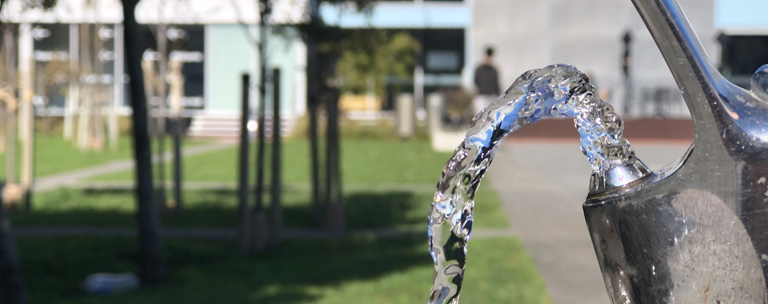In 2021 the small communities of Waikouaiti, Karitane and Hawkesbury just north of Dunedin had several detections of high lead levels in drinking water – leading to a coordinated public health response involving Dunedin City Council (DCC), the Ministry of Health, Public Health South (Southern DHB), and ESR.
Now, a review of this response by a team that includes ESR toxicologist Dr Belinda Cridge is being published as a paper for the recent Water NZ conference (18-20 October), ahead of International Lead Poisoning Prevention Week (23-29 October). The review illustrates the larger potential issue of lead exposure from drinking water due to corrosion of lead plumbing fixtures in Aotearoa New Zealand. One of the key outcomes was to recommend that people flush a cup of water from household taps first thing in the morning before drinking or cooking with it.
Dunedin City Council had previously detected several spikes in lead levels at multiple sites, while doing regular testing in these communities. On 29 January 2021, they detected lead within the raw water reservoir coming into the drinking water plant and issued a “Do Not Drink” notice. A public health response was launched to investigate the source of lead found in the water and to determine the extent of lead exposure in the community through blood screening. Dr Cridge says ESR’s role was to “help figure out what the potential risk of lead exposure to the community was,” and to support the council and public health unit in their efforts.
No amount of lead exposure has been deemed safe, and it is regarded as a toxin. Children and babies are most vulnerable to lead exposure because they absorb a greater amount of lead into their bodies. “We need to be particularly careful with young children. Their brains are still developing so they’re quire sensitive to the effects of lead, and with long-term lead exposure, we see neurological changes like a decrease in IQ,” explains Dr Cridge. Lead exposure in adults can cause high blood pressure and hypertension.
After an exhaustive six-month investigation in Waikouaiti, the “Do Not Drink” notice was removed. At that point, it was determined that there was no contamination of the main drinking water supply. “There hadn’t been any accumulation of lead in the population,” says Dr Cridge, and people who had drunk the contaminated water did not have higher blood lead levels than those who had not drunk it. The investigation indicated that the source of the high lead levels was corrosion of lead-containing plumbing, which caused lead to leach into the water.
Dr Cridge says that this incident highlights a larger potential issue relevant for the whole country: “We put a lot of work and time into this investigation in Waikouaiti, but this happens everywhere. The explanation we came down to is that water is slightly corrosive and there was corrosion in the plumbing materials. It could happen in any town.” Lead pipes and fittings are often present in the infrastructure of homes and buildings without people knowing about them. And many towns in Aotearoa New Zealand have water that is slightly corrosive, so when it sits in the pipes for a long time, the water begins to accumulate lead.
Luckily, the solution to this issue is relatively simple, and that is to flush your taps if the water has been sitting in the pipes for a while. “For most people that means when you get up in the morning, you should run about a cup full of water through your tap before using water for cooking or drinking,” explains Dr Cridge. “By doing that you bring in freshwater from the pipe and the street rather than drinking water that's been sitting in contact with the household plumbing. We know that the main water supply is compliant, as long as your supplier is compliant with the drinking water standards.”
This International Lead Poisoning Prevention Week (23-29 October), ESR aims to amplify this message throughout Aotearoa New Zealand. Flushing your taps is the best way to make sure you’re drinking water that is healthy and safe for everyone.

